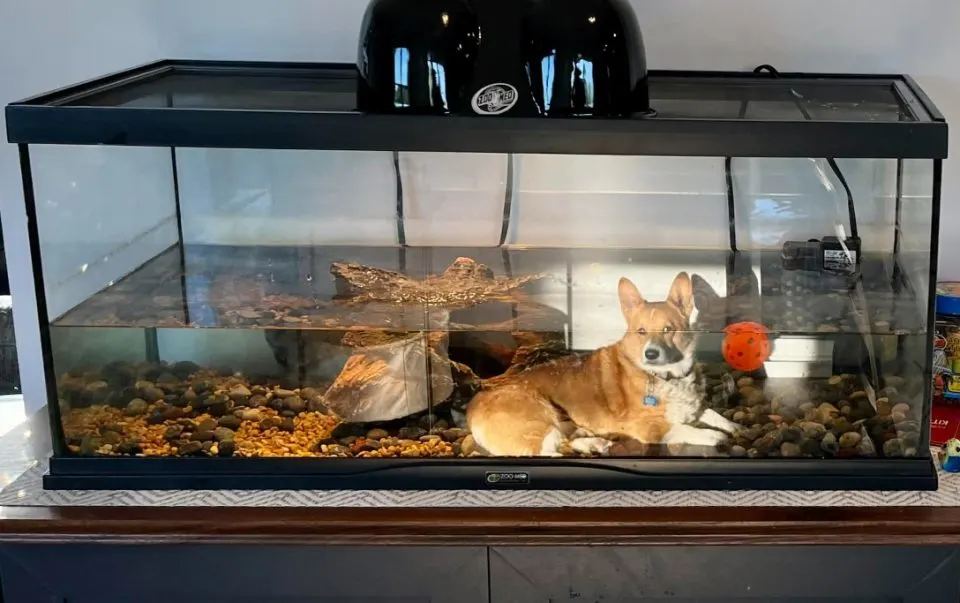Dogs are no strangers to hiding or relaxing in the most unusual places. I remember that my giant German Shepherd loved to rest inside boxes for some reason.
It was baffling how he would find a box to be comfortable, but there was nothing that could deter him from doing so. For some reason, they just love such weird activities.
In this story, we will talk about a dog who had seemingly ended up in a weird place and surprised his owner.
Meet Barkley Stumps

For as long as Tracey Noble knew her dog, Barkley, he was always a very happy Corgi who just loved to have fun. The family from Pennsylvania always made sure to document their interesting adventures.
However, one of his more recent adventures led him to an unusual place, or so Noble thought, at first.
One morning, Noble was cleaning her house and she glanced at something strange. She took a look at the aquarium where her turtle is staying and was surprised.
For a moment, it looked like her dog, Barkley, was inside the aquarium somehow. She couldn’t believe it.
Noble told The Dodo: I started laughing and grabbed my phone. It was magical. Barkley was in the tank!
A Weird Optical Illusion

She took a better look, and it turned out that the dog was really behind Noble the whole time. His reflection was the cause of a very specific angle of the sun’s rays hitting the aquarium.
Noble said: I couldn’t believe how clear the reflection of him was.
Noble called her daughter to have a look, and even she was stumped by the weird reflection on the aquarium.
The effect soon faded away, but the family made sure to capture the moment on camera, so they could have that precious memory.
Noble said: Barkley was excited that we were laughing and that he was the center of attention, for sure!

Noble made sure to let everyone know about this, so she shared the story online with her followers, and they, too, were surprised by this illusion.
She continued by saying: He would be thrilled to know that he brought so much happiness and wonder to so many people! I am not sure if I could capture that again if I tried!
If you’ve ever found yourself wondering why your furry friend always seems to have an insatiable appetite, you’re not alone. As a seasoned dog trainer, one of the most common concerns pet owners have is their dog’s constant hunger. It can be puzzling when your pup acts like they haven’t eaten in days, even right after a meal.
You may notice your dog giving you those puppy eyes, begging for more treats or constantly sniffing around for food. Understanding the reasons behind your dog’s perpetual hunger can shed light on their behavior and help you ensure they’re getting the right nutrition. So, let’s take a closer look at the possible factors that could be fueling your dog’s endless craving for food.
Decoding the Hunger: Is Your Dog Really Always Hungry?
Understanding Canine Appetite
When it comes to your dog always seeming hungry, it’s essential to understand that dogs have a strong sense of smell and a natural instinct to scavenge for food. This behavior may make them appear more voracious than they actually are. It is crucial to differentiate between your dog’s genuine hunger and behavior like seeking attention, boredom, or anxiety, which can also manifest as constant begging for food.
The Difference Between Hunger and Begging
Hunger is a physiological need for nourishment, while begging is more about seeking your attention or satisfying emotional needs. Your dog might beg for food not because they are hungry, but because they have learned that it’s a way to get what they want. It’s important to establish a feeding routine and ensure that your dog is getting a balanced diet to prevent unnecessary begging behavior. Remember, responding to begging can reinforce this conduct, even when your dog is not truly hungry.
Common Reasons Behind Excessive Hunger in Dogs
Dietary Deficiencies
When your dog seems constantly hungry, it could be due to dietary deficiencies. If their food lacks essential nutrients like proteins and fats, they may feel unsatisfied even after eating. This can cause them to seek out more food to fulfill their nutritional needs. Ensuring your pup’s diet is balanced and meets their requirements is crucial to prevent excessive hunger.
Digestive Issues
Digestive problems can also contribute to your dog always feeling hungry. Issues like malabsorption or gastrointestinal disorders can affect how well your dog absorbs nutrients from their food, leaving them wanting more. If your furry friend is experiencing frequent hunger pangs, it might be worth consulting your vet to rule out any underlying digestive issues.
The Role of Breed and Age
The breed and age of your dog play a significant role in their appetite. Certain breeds have a predisposition to being more food-driven, while age can affect metabolism and energy levels. Puppies, for example, have higher energy requirements and may seem hungrier as they grow. Understanding your dog’s breed characteristics and adjusting their diet accordingly can help manage their hunger levels effectively.
Psychological Factors of a Dog’s Constant Hunger
Anxiety and Stress
When your dog is constantly hungry, it could be due to anxiety and stress. Just like humans, dogs can experience emotions that affect their eating habits. Stress and anxiety can lead to increased appetite in dogs. Loud noises, changes in routine, or being left alone for extended periods can trigger anxiety in your furry friend, causing them to seek comfort in food. It’s essential to address the root cause of your dog’s stress to help regulate their hunger levels.
Conditioning and Routine
Your dog’s constant hunger might also be a result of conditioning and routine. Dogs are quick to learn patterns and associate certain behaviors with rewards, such as treats or extra food. If you’ve unintentionally reinforced begging behavior by giving in to your dog’s demands, they may continue to act hungry even when they are not. Establishing a consistent feeding schedule and avoiding feeding your dog from the table can help break this cycle of conditioning and maintain a healthy appetite for your pet.
Medical Conditions That Can Cause Increased Hunger
Diabetes and Thyroid Problems
When it comes to your dog always feeling hungry, medical conditions like diabetes or thyroid problems could be the culprits. Diabetes can lead to excessive hunger as the body can’t regulate blood sugar properly, while thyroid issues can also affect metabolism, resulting in increased appetite in your furry friend.
Parasitic Infections
Parasites might be another reason why your dog is constantly seeking food. Worms or other parasites can disrupt your dog’s digestive system, causing them to eat more than usual. Regular parasite prevention and treatment can help resolve this issue and regulate your dog’s hunger levels.
Other Underlying Health Issues
Apart from diabetes, thyroid problems, and parasitic infections, there are various other health issues that could contribute to your dog’s insatiable appetite. Conditions like pancreatitis, Cushing’s disease, or even certain medications can affect your dog’s hunger cues. Consulting with your veterinarian to rule out any underlying health issues is crucial in addressing your dog’s relentless hunger.
Managing Your Dog’s Hunger
Appropriate Feeding Practices
To manage your dog’s hunger effectively, ensure you establish a consistent feeding routine. Stick to regular mealtimes, avoiding excessive treats that may encourage begging behavior. Offer a balanced and nutritious diet suited to your dog’s age, breed, and size. Avoid feeding your furry friend human food as it can lead to obesity and nutritional imbalances. Providing adequate exercise alongside meals can also help regulate your dog’s appetite.
When to Consult a Veterinarian
If you notice persistent excessive hunger in your dog despite appropriate feeding practices, it’s crucial to consult a veterinarian promptly. Excessive hunger can sometimes indicate underlying medical conditions such as diabetes, thyroid issues, or parasites. Your vet can conduct necessary tests to rule out any health problems causing your dog’s increased appetite. Additionally, sudden changes in eating habits or unexplained weight loss should also prompt a visit to the veterinarian for a thorough evaluation and appropriate treatment.
Conclusion
So, there you have it – your furry friend’s constant hunger might stem from various reasons like seeking attention, boredom, or even anxiety. Understanding your dog’s behavior is key to addressing their insatiable appetite. By establishing a consistent feeding routine and providing a well-balanced diet, you can help curb unnecessary begging. Remember, dietary deficiencies, breed, age, and psychological factors can also play a role in your dog’s hunger levels. To keep your pup healthy and happy, ensure they receive the right food for their age and breed, limit treats, and incorporate regular exercise. If your dog’s hunger seems excessive, consulting a vet is always a good idea to rule out any underlying medical conditions. Your furry companion’s well-being is a top priority, so keep an eye on their eating habits and make adjustments as needed.
Frequently Asked Questions
Why is my dog always hungry?
Dogs can feel constantly hungry due to various reasons like seeking attention, boredom, anxiety, dietary deficiencies, or health issues. Establishing a feeding routine, offering a balanced diet, and ensuring enough exercise can help address excessive hunger.
How can I prevent my dog from begging for food constantly?
Prevent unnecessary begging by maintaining a consistent feeding schedule, providing a balanced diet suitable for your dog’s age and breed, and avoiding excessive treats and human food. Engaging your dog in regular exercise can help regulate their appetite and reduce persistent begging behavior.
When should I seek veterinary advice for my dog’s excessive hunger?
Consult a veterinarian if your dog shows persistent excessive hunger, as it could indicate underlying medical conditions like diabetes, thyroid issues, or parasites. The vet can conduct necessary tests to diagnose any health problems contributing to your dog’s increased appetite and recommend appropriate treatment.
[no_toc]

Hey there, I’m Janet Brooks, a dog-loving student from California. I’m all about helping pups in need, especially those without homes. Me and my awesome friends work together to give shelter and love to stray dogs. Oh, and I also write blogs about dogs to share helpful info.